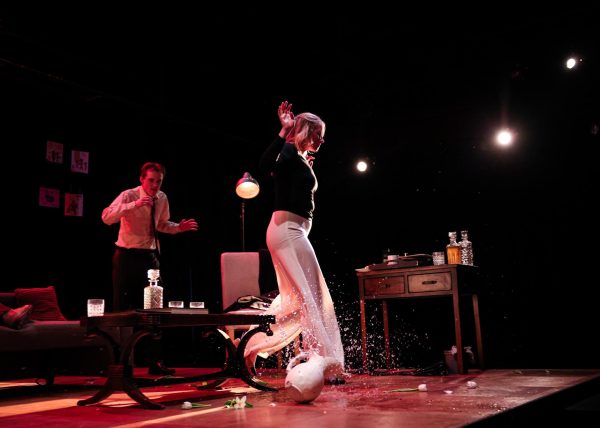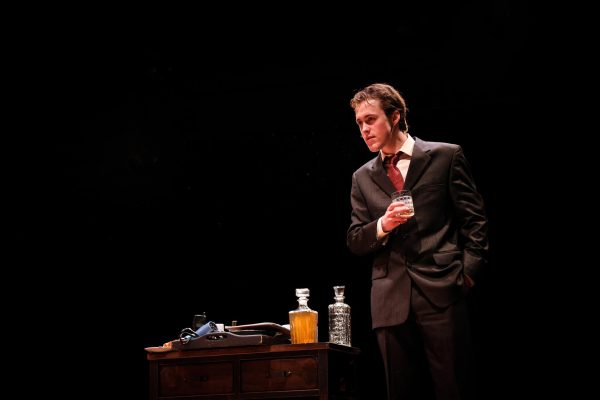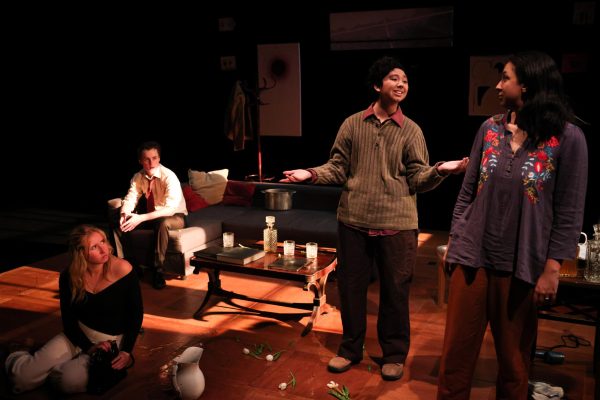
Theatergoers who entered the Freimann Stage on Oct. 8 and 9 were met with an intimate, homey atmosphere. The set transformed the smaller space into a cozy living room complete with a hardwood floor, tasteful home decor and children’s artwork lining the wall like something straight out of a Pottery Barn catalog. However, after the lights dimmed the comfortable atmosphere shattered as sharp tensions arose as two couples flew into intense fits of rage, sorrow and cruelty over a dispute between their children.
“God of Carnage”, a play written by Yasmina Reza, set the stage perfectly for senior Kellen Flynn to execute the project component of his honor’s thesis in Theater and Dance. The show sold out both evenings, and the hilarity of the ever-changing relationship dynamics between couples Alan (Nathan Gauthier) and Annette (Annick Adams) Raleigh and Michael (Jay Liao-Troth) and Veronica (Brooklyn Butler) kept audiences engaged in a whirlwind of shifting emotions despite the small cast size.
The plot follows the ridiculousness that ensues when Novaks’ child is hit by the Raleighs’ child at the park, causing the parents to attempt to mediate the conflict even as they become more and more immature themselves. Flynn’s directorial choices ensured that the play maintained its hilarity while also making broader, more subtle commentary about the nature of class, conflict and masculinity.
From the moment the two families walk onto the stage, they’re coded as opposed through their costuming done by sophomore Eliza Van De Rostyne, with the Raleighs’ donning outfits that scream “old money” with their classic elegance and the Novak’s wearing earthy, natural looking clothes. These stylistic differences are heightened by the physical distance between the couples on the stage—as the show begins, the couples are seated on opposite couches, practically as far away from each other as is possible in the small living room.

The couples initially jab each other through small talk, and in the script, this small talk repeatedly gets retooled into a means of escalating the bickering. In Flynn’s production, this repetition is met with varied lengths of pauses, differing delivery and shifting pacing. The shifting representations of repeated themes means the conversation’s insularity nearly escapes detection. The circular conversations in the play add to the sense of chaos, leaving the audience entangled in the obsessive speech patterns of the characters.
Flynn uses these opening subtle scenes of tension to display the faults of both couples, playing with the stage’s small space to create a palpable unease. As the fight begins to reveal discordances between the couples themselves, characters rapidly move around the room, physically aligning themselves with whomever they’re currently verbally siding with. This directorial choice means that the smaller set size becomes an asset, where even slight movements feel like intense displays of allegiance that reveal complex social dynamics.
When the men bond over their shared experience in what they call childhood “gangs,” their diatribes about masculine bonding through roughhousing are met with dramatic movements around the stage that crescendo in intensity and volume, culminating with the physical violence of the characters themselves. When the play begins with subtle fractures in politeness, the payoff of gratuitous all-out fighting is dramatically elevated. The gradual escalation means that when the parents throw a purse across the room, deliver a slap or even vomit, their actions become shock-worthy moments that trigger gasps across the audience.
By lulling audiences into a false sense of security with repetitive passive-aggressive arguments in the play’s opening, Flynn’s rendition of “God of Carnage” uses pacing and variation to ensure the concluding violence packs a punch with audiences.



Kellen Flynn • Oct 24, 2024 at 9:51 am
Thank you for the kind review!